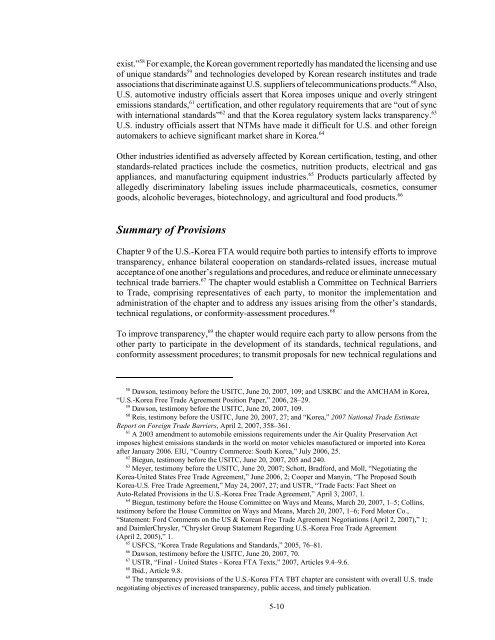U.S.-Korea Free Trade Agreement: Potential Economy-wide ... - USITC
U.S.-Korea Free Trade Agreement: Potential Economy-wide ... - USITC
U.S.-Korea Free Trade Agreement: Potential Economy-wide ... - USITC
Create successful ePaper yourself
Turn your PDF publications into a flip-book with our unique Google optimized e-Paper software.
exist.” 58 For example, the <strong>Korea</strong>n government reportedly has mandated the licensing and use<br />
of unique standards 59 and technologies developed by <strong>Korea</strong>n research institutes and trade<br />
associations that discriminate against U.S. suppliers of telecommunications products. 60 Also,<br />
U.S. automotive industry officials assert that <strong>Korea</strong> imposes unique and overly stringent<br />
emissions standards, 61 certification, and other regulatory requirements that are “out of sync<br />
with international standards” 62 and that the <strong>Korea</strong> regulatory system lacks transparency. 63<br />
U.S. industry officials assert that NTMs have made it difficult for U.S. and other foreign<br />
automakers to achieve significant market share in <strong>Korea</strong>. 64<br />
Other industries identified as adversely affected by <strong>Korea</strong>n certification, testing, and other<br />
standards-related practices include the cosmetics, nutrition products, electrical and gas<br />
appliances, and manufacturing equipment industries. 65 Products particularly affected by<br />
allegedly discriminatory labeling issues include pharmaceuticals, cosmetics, consumer<br />
goods, alcoholic beverages, biotechnology, and agricultural and food products. 66<br />
Summary of Provisions<br />
Chapter 9 of the U.S.-<strong>Korea</strong> FTA would require both parties to intensify efforts to improve<br />
transparency, enhance bilateral cooperation on standards-related issues, increase mutual<br />
acceptance of one another’s regulations and procedures, and reduce or eliminate unnecessary<br />
technical trade barriers. 67 The chapter would establish a Committee on Technical Barriers<br />
to <strong>Trade</strong>, comprising representatives of each party, to monitor the implementation and<br />
administration of the chapter and to address any issues arising from the other’s standards,<br />
technical regulations, or conformity-assessment procedures. 68<br />
To improve transparency, 69 the chapter would require each party to allow persons from the<br />
other party to participate in the development of its standards, technical regulations, and<br />
conformity assessment procedures; to transmit proposals for new technical regulations and<br />
58 Dawson, testimony before the <strong>USITC</strong>, June 20, 2007, 109; and USKBC and the AMCHAM in <strong>Korea</strong>,<br />
“U.S.-<strong>Korea</strong> <strong>Free</strong> <strong>Trade</strong> <strong>Agreement</strong> Position Paper,” 2006, 28–29.<br />
59 Dawson, testimony before the <strong>USITC</strong>, June 20, 2007, 109.<br />
60 Reis, testimony before the <strong>USITC</strong>, June 20, 2007, 27; and “<strong>Korea</strong>,” 2007 National <strong>Trade</strong> Estimate<br />
Report on Foreign <strong>Trade</strong> Barriers, April 2, 2007, 358–361.<br />
61 A 2003 amendment to automobile emissions requirements under the Air Quality Preservation Act<br />
imposes highest emissions standards in the world on motor vehicles manufactured or imported into <strong>Korea</strong><br />
after January 2006. EIU, “Country Commerce: South <strong>Korea</strong>,” July 2006, 25.<br />
62 Biegun, testimony before the <strong>USITC</strong>, June 20, 2007, 205 and 240.<br />
63 Meyer, testimony before the <strong>USITC</strong>, June 20, 2007; Schott, Bradford, and Moll, “Negotiating the<br />
<strong>Korea</strong>-United States <strong>Free</strong> <strong>Trade</strong> <strong>Agreement</strong>,” June 2006, 2; Cooper and Manyin, “The Proposed South<br />
<strong>Korea</strong>-U.S. <strong>Free</strong> <strong>Trade</strong> <strong>Agreement</strong>,” May 24, 2007, 27; and USTR, “<strong>Trade</strong> Facts: Fact Sheet on<br />
Auto-Related Provisions in the U.S.-<strong>Korea</strong> <strong>Free</strong> <strong>Trade</strong> <strong>Agreement</strong>,” April 3, 2007, 1.<br />
64 Biegun, testimony before the House Committee on Ways and Means, March 20, 2007, 1–5; Collins,<br />
testimony before the House Committee on Ways and Means, March 20, 2007, 1–6; Ford Motor Co.,<br />
“Statement: Ford Comments on the US & <strong>Korea</strong>n <strong>Free</strong> <strong>Trade</strong> <strong>Agreement</strong> Negotiations (April 2, 2007),” 1;<br />
and DaimlerChrysler, “Chrysler Group Statement Regarding U.S.-<strong>Korea</strong> <strong>Free</strong> <strong>Trade</strong> <strong>Agreement</strong><br />
(April 2, 2005),” 1.<br />
65 USFCS, “<strong>Korea</strong> <strong>Trade</strong> Regulations and Standards,” 2005, 76–81.<br />
66 Dawson, testimony before the <strong>USITC</strong>, June 20, 2007, 70.<br />
67 USTR, “Final - United States - <strong>Korea</strong> FTA Texts,” 2007, Articles 9.4–9.6.<br />
68 Ibid., Article 9.8.<br />
69 The transparency provisions of the U.S.-<strong>Korea</strong> FTA TBT chapter are consistent with overall U.S. trade<br />
negotiating objectives of increased transparency, public access, and timely publication.<br />
5-10

















